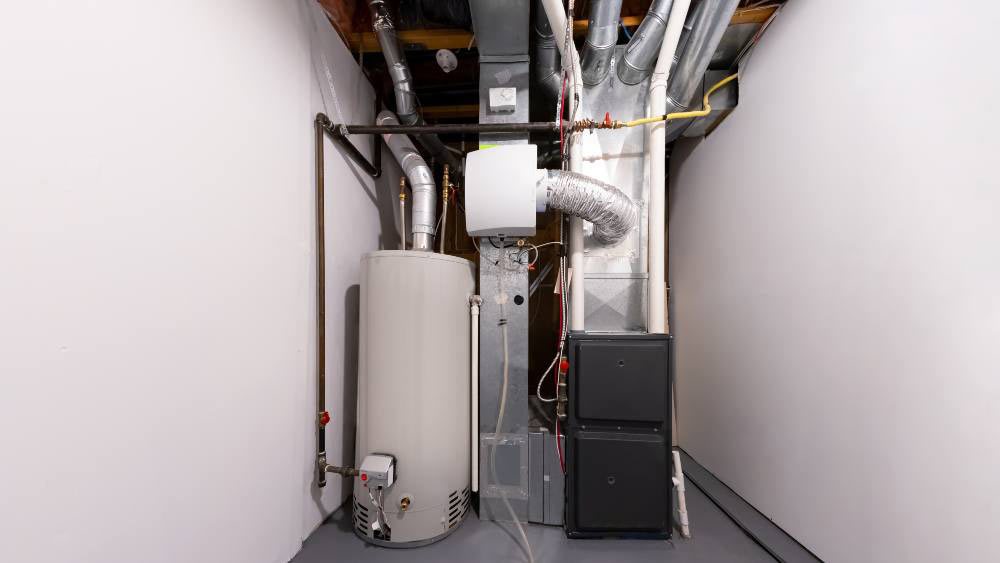As the chill of winter sets in, the importance of a reliable heating system becomes undeniably clear. Central heating, a system designed to keep the cold at bay and ensure your living or working space remains comfortably warm, is a marvel of modern construction. It operates by distributing heat from a central point throughout a building, ensuring each room is evenly warmed.
This article delves into the intricacies of central heating, from how it works to the different types available, and even tips on maintenance. Whether you’re curious about the benefits of installing a central heating system or seeking advice on upkeep, this comprehensive guide offers valuable insights into creating a cozy and efficient environment for your home or office.
Central Heating: A Comprehensive System for Warmth Distribution
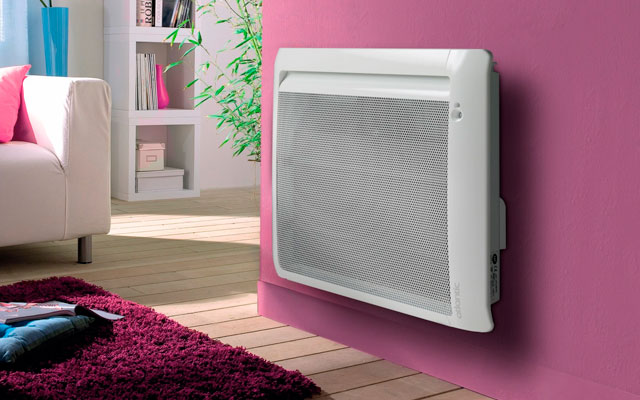
Central heating stands as a pivotal system designed to distribute warmth throughout the interior spaces of a building, effectively moving heat from a single source to various rooms. This system, integral to maintaining a comfortable indoor environment, especially in colder climates, operates through a network of pipes, radiators, or ducts, depending on the type of heating used—be it water, steam, or air. Central heating not only enhances the comfort of occupants but also ensures a uniform distribution of heat, eliminating cold spots and creating a homely atmosphere.
Its efficiency and convenience have made it a standard installation in modern construction, underscoring its importance in residential and commercial buildings alike. Through a comprehensive understanding of its operational mechanics and benefits, one can appreciate the significance of central heating in improving living and working conditions, making it a fundamental aspect of contemporary infrastructure.
Also Read: Can You Have Central Air Without An Outside Unit?
How does central heating work?
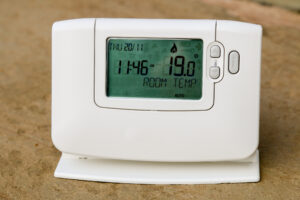
Central heating works by circulating warm water or air through a network of pipes or ducts spread throughout a building. At its heart is a heat source, which can be a boiler, heat pump, or electric heater. This heat source generates warmth, then water or air, heated by this source, travels through the system to radiate heat into rooms via radiators or vents.
The process ensures that heat is evenly distributed, making every corner of the building comfortably warm. This system’s efficiency lies in its ability to provide consistent warmth from a single, centralized location, making it an ideal solution for heating multiple rooms or spaces within a building.
It Circulates Warm Water
Central heating efficiently moves warm water through a network of pipes, radiating heat from radiators or underfloor heating systems to warm rooms evenly.
The Heat Source Can Be a Boiler, Heat Pump, or Electric Heater
The essential warmth for the system originates from a heat source such as a boiler, heat pump, or electric heater. Each option provides the necessary heat to warm the water or air, facilitating the heating of the building.
What are the types of central heating systems?
Central heating systems can be categorized based on their heat source and method of heat distribution. Boiler-based systems utilize boilers to heat water, which is then circulated through radiators or underfloor heating. Gas boilers and oil boilers are common, using natural gas or oil to generate heat.
Heat pump systems, including air source heat pumps and ground source heat pumps, extract heat from the air or ground outside to warm the building. Lastly, electric storage heaters use electricity to heat bricks or other materials overnight, which then release heat throughout the day. Each type offers unique benefits and is suited to different property sizes and climate conditions.
Boiler-based Systems
Boiler-based systems heat water in a boiler, then circulate it through pipes to radiators or underfloor heating systems, providing warmth throughout the building.
Gas Boilers
Gas boilers utilize natural gas to heat water, efficiently circulating it to deliver consistent warmth.
Oil Boilers
Similar to gas boilers, oil boilers use oil as a fuel source to heat water, suitable for areas without natural gas supply.
Heat Pump Systems
Heat pump systems leverage external heat from the air or ground, using it to warm the interior of buildings.
Air Source Heat Pumps
Air source heat pumps extract heat from the outside air, effectively heating homes even in colder temperatures.
Ground Source Heat Pumps
Ground source heat pumps harness heat from the ground through pipes buried outside, offering an eco-friendly heating solution.
Electric Storage Heaters
Electric storage heaters charge up overnight using electricity to heat internal elements like bricks, which then release the stored heat throughout the day.
Wondering about the cost of upgrading your home’s comfort? This guide breaks down the factors that influence the price of replacing your heating and air conditioning system: How Much to Replace a Heating and Air Conditioning System
What are the benefits of central heating?
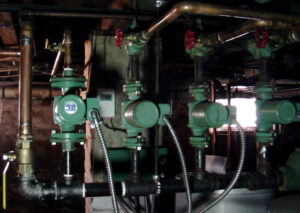
Central heating systems offer several key benefits, including consistent warmth throughout a building, making every room comfortable to live or work in. They can be more energy-efficient than using individual heaters, as they distribute heat evenly and are often powered by modern, efficient technologies. Additionally, central heating can improve indoor air quality by reducing dampness and condensation, creating a healthier environment for occupants.
These systems are adaptable to various energy sources, including gas, electricity, and renewables, providing flexibility in operation and potential cost savings. Overall, central heating enhances comfort, efficiency, and health in residential and commercial spaces.
Provides Consistent Warmth Throughout the Building
Central heating ensures every room is comfortably warm, eliminating cold spots and creating a cozy environment.
Can Be More Energy-Efficient Than Individual Heaters
Using a central system for heating is often more efficient, saving energy and potentially reducing utility bills.
Improves Indoor Air Quality by Reducing Dampness and Condensation
By maintaining a consistent temperature, central heating helps to lower humidity levels, reducing dampness and improving the air quality inside the building.
Also Read: Understanding What is Forced Air Heating Systems
What are the considerations when installing central heating?
When installing central heating, several important considerations must be taken into account to ensure the system is efficient, effective, and suitable for the property. The size of the property is crucial, as larger homes may require more powerful systems to heat the space adequately. The type of central system that is best suited for the property depends on various factors, including the building’s insulation, local climate, and the availability of energy sources.
Climate and energy source availability can greatly influence the choice of system, with some energy sources being more readily available and cost-effective in certain regions. Additionally, the availability and cost of energy sources vary by location, which can affect the operating costs and environmental impact of the heating system. Selecting the right system involves balancing these considerations to achieve a comfortable, energy-efficient, and economically viable heating solution.
The Size of the Property
The size of the property directly impacts the capacity needed in a heating system to ensure efficient warmth distribution.
Larger Homes May Require More Powerful Systems
For larger spaces, more powerful heating solutions are necessary to maintain consistent warmth throughout the property.
The Type of System Best Suited for the Property
Selecting a heating system depends on the property’s specific needs, including insulation quality, layout, and existing infrastructure.
Climate and Energy Source Availability Can Influence Choice
The local climate and the availability of different energy sources can significantly affect the choice of the heating system.
The Energy Source (Gas, Electricity, Renewable)
Options for heating include gas, electricity, and renewable sources, each with its benefits and considerations for efficiency and sustainability.
Availability and Cost of Energy Sources Vary by Location
The feasibility and cost-effectiveness of a heating system can vary greatly depending on local access to and prices of energy sources.
Also Read: When To Replace Heating And Air Conditioning? Hvac Experts Answer!
How to Maintain a Central Heating System?

Maintaining a central heating system is crucial for its efficiency and longevity. Regular servicing by a qualified professional is essential to ensure the system operates at peak performance. Annual check-ups can help prevent breakdowns by identifying and fixing any issues early on.
Bleeding radiators to remove air pockets is another key step, as it ensures efficient heating and reduces noise. Additionally, checking the boiler pressure regularly is important; low pressure can indicate leaks, while high pressure can stress the system. By following these maintenance steps, homeowners can enjoy consistent warmth and avoid costly repairs.
Regular Servicing by a Qualified Professional
Having a qualified professional service the system regularly ensures it runs smoothly and efficiently, maintaining optimal performance.
Annual Check-Ups Can Prevent Breakdowns
Annual check-ups are crucial in identifying and addressing potential issues early on, preventing costly breakdowns and extending the system’s lifespan.
Bleeding Radiators to Remove Air Pockets
Bleeding radiators is essential for removing air pockets, which ensures efficient heating throughout the building and reduces noise from the heating system.
Ensures Efficient Heating and Reduces Noise
Regular maintenance, including bleeding radiators, optimizes the heating system’s performance, leading to more efficient heating and lower noise levels.
Checking the Boiler Pressure Regularly
Regularly checking the boiler pressure is key to maintaining system health; low pressure can indicate leaks, while high pressure may stress the system.
Low Pressure Can Indicate Leaks; High Pressure Can Stress the System
Monitoring pressure levels helps in identifying potential leaks or areas where the system may be overly stressed, ensuring the system’s longevity and reliability.
Optimizing Your Comfort: The Power of Central Heating
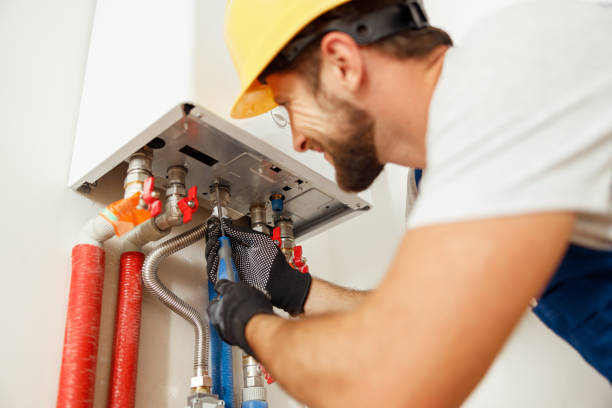
Central heating is a vital system for distributing warmth throughout a building, offering consistent comfort, energy efficiency, and improved indoor air quality. Various types, including boiler-based, heat pump, and electric storage heaters, cater to different needs and preferences. Key considerations for installation include property size, system type, climate, and energy source availability.
Regular maintenance, such as annual check-ups, bleeding radiators, and monitoring boiler pressure, is crucial to ensure the system’s efficiency and longevity. Understanding these aspects allows homeowners and businesses to make informed decisions regarding their heating solutions, ensuring optimal warmth and comfort in their spaces.
Don’t let another winter catch you unprepared. Contact Callidus Air today for a free consultation and take the first step towards a cozier, more energy-efficient home. Callidus Air is here to help. Our expert team specializes in designing, installing, and maintaining central heating systems tailored to your unique needs.

